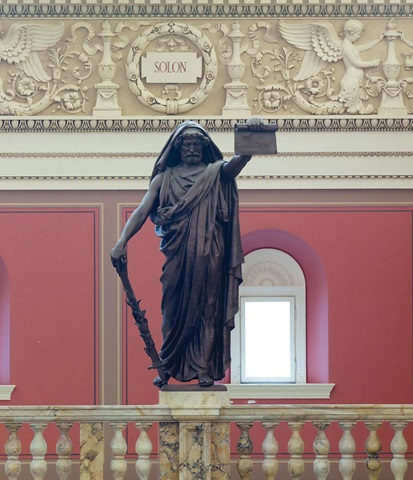
Statue of Solon in the Library of Congress,
Washington DC, Thomas Jefferson Building




Beate Fränzle (1961-2024) had a long career as a scholar, as can be seen from the blurbs of her publications:
Beate Fränzle also used to publish under the names Beate Noack and Beate Noack-Hilgers.
In her publication Solon bei Platon, Beate Fränzle deals with the relationship between Solon and Plato. She comes to the conclusion that Plato was largely influenced by Solon. In doing so, she contradicts Kathryn A. Morgan, among others, who is of the opinion that the depiction of Solon in Plato's dialogues is "platonised" and therefore not realistic. Currently, Kathryn A. Morgan's opinion seems to prevail. Beate Fränzle now turns this thesis on its head: in truth, it is the other way round, in truth Solon was not "platonised", but Plato was "solonised". This means that the depictions of Solon in Plato's dialogues should be taken more seriously again.
This is also important for the interpretation of the Atlantis story, which, according to Plato, is said to have been brought to Athens from Egypt by Solon. Beate Fränzle is of the opinion that Plato – unlike Homer – was concerned with truth (aletheia) and not just with allegory or imagery:
"The aletheia content of Solon's surviving poem fragments is arguably beyond question. Plato also develops the Atlantis epic planned by Solon with the historical war between the primeval Athenians and the Atlanteans in the double dialogue Timaeus-Critias and in the Republic, skilfully directing the expectations of his readers through intertextual references and signal words, as a poetic counter-model to the Homeric epics, which depicted the mythical war for Troy."
(Fränzle (2023) p. 184 f.; translated by Thorwald C. Franke; emphasis in original, German original version see in the appendix)
The truth of the Atlantis story and of Plato's cataclysm theory – always to be understood from Plato's point of view – is reaffirmed a few pages later:
"This introduction of Solon as an authority for Critias' narrative about primeval Athens and Atlantis, incidentally, speaks (in addition to the arguments mentioned above) in favour of the truth content of the lógos ap’ Aigýptou, consequently for the suitability of a Solonian Atlantis epic as an educational medium in the ideal state. ... the fundamental importance of Solon as guarantor for the transmission of the Atlantis narrative and of the cataclysm theory, and thus for Plato's theory of state and of history, is beyond question."
(Fränzle (2023) p. 202; translated by Thorwald C. Franke; German original version see in the appendix)
Beate Fränzle thus takes the view that Plato meant the Atlantis story to be true and historical, i.e. real. Whether this story from Egypt actually has any truth to it, and what that truth is, is not yet clear. Basically, Beate Fränzle belongs more in the camp of Atlantis supporters than Atlantis sceptics.
Beate Fränzle has announced a publication entitled Solons Götter – Platons Theologie, in which she will take a closer look at these theses. The article Solon bei Platon is an early extract from the forthcoming publication.
CAUTION! In her book "Solons Götter – Platons Theologie" from 2025, Beate Fränzle surprisingly puts forward the opinion that Atlantis was an invention by Plato. See the review of this book.
Noack-Hilgers (1990/92): Beate Noack-Hilgers, Aristarch von Samos – Untersuchungen zur Überlieferungsgeschichte der Schrift Peri megethon kai apostematon heliu kai selenes, Dissertation 1990, published by Reichert, Wiesbaden 1992.
Noack (2021): Beate Noack, Der Ursprung Europas in der griechischen Antike – Religionen und Naturwissenschaften, Volume 20 of the series: Flensburger Studien zu Literatur und Theologie, published by Igel, Hamburg 2021.
Fränzle (2023): Beate Fränzle, Solon bei Platon, in: Georges Goedert / Martina Scherbel (eds.), Perspektiven der Philosophie – Neues Jahrbuch, Vol. 49, Koninklijke Brill NV, Leiden 2023; pp. 171-208.
"Der aletheia-Gehalt der überlieferten Gedichtfragmente Solons steht wohl außer Frage. Auch das von Solon geplante Atlantis-Epos mit dem historischen Krieg zwischen Urathenern und Atlantern entwickelt Platon im Doppeldialog Timaios-Kritias und in der Politeia, die Erwartungshaltung seiner Leser geschickt lenkend durch intertextuelle Verweise und Signalwörter, als poetisches Gegenmodell zu den homerischen Epen, die den mythischen Krieg um Troja schilderten."
(Fränzle (2023) S. 184 f.; Hervorhebung im Original)
"Diese Einführung Solons als Autorität für Kritias’ Erzählung über Urathen und Atlantis spricht übrigens (neben den oben genannten Argumenten) für den Wahrheitsgehalt des lógos ap’ Aigýptou, mithin für die Eignung eines solonischen Atlantis-Epos als Erziehungsmedium im Idealstaat. ... die fundamentale Bedeutung Solons als Gewährsmann für die Überlieferung der Atlantis-Erzählung und der Kataklysmen-Theorie, damit für die Staats- und Geschichtstheorie Platons steht außer Frage."
(Fränzle (2023) S. 202)